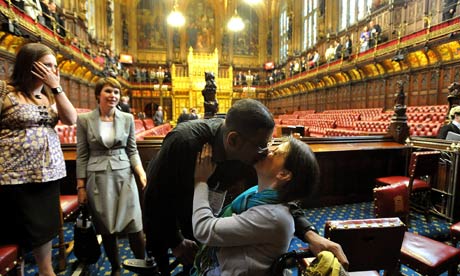
Debbie Purdy with her husband Omar, delighted by the last Law Lords ruling in the House of Lords in Westminster. Photograph: John Stillwell/PA
Grinning in the sunshine outside the Houses of Parliament yesterday, Debbie Purdy gripped her husband Omar's hand and did not let go. She had been fighting for two years to know that she would be able to hold that hand when she died, and with the highest court in the land's order that the law on assisted suicide must be clarified, that right was a step closer.
There were no tears as she and jazz violinist Omar Puente reflected on their landmark legal victory, just broad smiles and a sense of sheer delight.
"It's like having my life back," said Purdy, who is dying from multiple sclerosis. "If it's about living life, he's the reason I live mine."
It is now possible that Puente will be told he will not risk 14 years in jail if he travels with his wife to the Swiss clinic Dignitas, where she wishes to die if her condition worsens.
Purdy, 46, who grew up in Berkshire and London, said the judgment had freed her from the constant anxiety that she had to make a decision to go there alone while she was still physically able.
"We can live our lives. We don't have to plan my death.
"I think people are beginning to realise it's not a right to die, it's a right to live, and a right to live with dignity, and with choice, and to know what your choices are."
'An incredible start'
There was one regret: the absence of fellow campaigner Diane Pretty, who died unassisted in 2002, a year after losing her battle to get her husband granted immunity from prosecution if he helped her to die.
But the ruling was an "incredible start", Purdy said, giving the director of public prosecutions, Keir Starmer, an "amazing" opportunity.
She was impressed by Starmer's promise to produce an interim policy for prosecutors by the end of September.
"He's shown a preparedness to act quickly," Purdy said. "That seems a first for a British anything, doesn't it?"
She also had praise for the five lords who made the decision,: "It is amazing to hear the House of Lords actually listening to the public for once."
Purdy said she would be putting the extra time the ruling gave her to good use, making sure she was part of the forthcoming consultation on the law. "I'm not exactly a retiring, shy person," she said.
Purdy and Cuban-born Puente have been battling her MS since shortly after their relationship began 14 years ago.
After quitting her humanities studies at university in Birmingham and working in sales, Purdy began travelling. Her wanderlust took her to Japan, Hong Kong, Norway and, eventually, Singapore.
A self-confessed adrenaline junkie who had revelled in travelling the world diving from planes, conquering mountains, trekking through jungles and exploring the depths of the oceans, she earned her living working as a music journalist, waitress, dancer and jewellery seller. Purdy already had early symptoms of the illness when she met her husband in Singapore while reviewing his salsa band.
The pair started seeing each other, but when she returned to England soon after, in 1995, an MRI scan revealed the truth about the mysterious sensations she had felt when out dancing with friends in a Yorkshire nightclub – "like wading through honey" as she later described it.
Before she flew back to Singapore she called the Spanish embassy to ask what the word for MS was so she could tell Puente, not knowing what he would think.
He was at the airport waiting for her and has not left her side since.
Puente was a great support from the moment she was diagnosed, Purdy said. "He didn't know what MS would entail and neither did I. We needed each other."
The pair spent two years travelling together with his band, and the illness went with them. On one occasion, in 1996, they went scuba diving and as they walked on the beach Puente noticed to his horror that Purdy was leaving bloody footprints in her wake, unaware that her feet were being cut by the shingle.
In 1997, her health deteriorating, she decided to return to England, and despite finding the weather somewhat cold and wet for his tastes, Puente came with her. They settled in Bradford and were married the following year.
Constant pain
By 2001, now using a wheelchair, Purdy had begun to consider euthanasia, inspired by Pretty's case. She began campaigning on the law soon after, and started her legal action in 2007. The high court's rejection of her case last October was "a kick in the guts" but there was a glimmer of hope in their allowing of the appeal that bore fruit yesterday.
She still enjoys life in her adapted home in Bradford, but is having increasing problems. She uses an electric wheelchair because her arms are no longer strong enough to propel a manual chair, is unable to turn over in bed unaided, and takes painkillers every day. Her feet, swollen by bad circulation, were clad only in socks as she heard the ruling delivered at the House of Lords.
The debilitating illness could not have been more alien to someone who even the year she was diagnosed was whitewater rafting and leaping from aeroplanes, and had delighted in her independence, living around the world and supporting herself with such confidence.
But as she sped along the pavement in Westminster yesterday, captured on film by cameramen and baffled tourists alike, repeating the words "we won!", it was clear she had been given a new lease of life. And as he put his hand over hers, Puente expressed his own relief. "It gives her an opportunity to relax, to enjoy life more," he said. Then he leaned in and kissed her, and did not let go.
source
